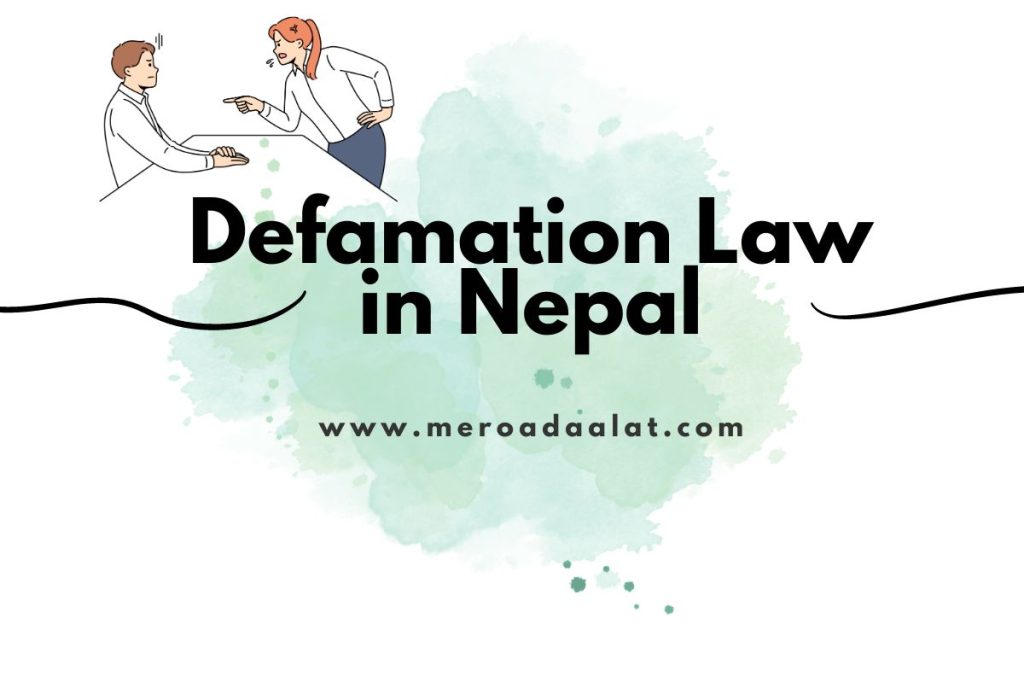This article will guide you through all the provisions relating to defamation law in Nepal. Gaali Beijati is a criminal offense according to the Muluki Criminal Code 2074.
Defaming others whether by word or by writing or by an electronic mechanism to the detriment of the other person is the offense of Defamation. It may be categorized into two categories:
- slander (gali)
- libel (beijati)
Defamation is effective if it is only made in the presence of the third party
Chare of defamation does not lie if the expression is of common nature like “all lawyers are thieves.”

Defamation Law in Nepal – Legal Provisions
Prohibition of Committing Slander (Gaali)
If any person imputes the other party with false facts to degrade him in the eye of a third party with abusive words is guilty of Slander. No person shall slander another person.
Punishment for Slander
A person who commits, or causes to be committed, this offense shall be liable to a sentence of imprisonment for a term not exceeding one year or a fine not exceeding ten thousand rupees or both sentences.
Prohibition of Committing Libel (Beijati)
A person is guilty of libel if s/he has committed the following activities intentionally to damage others’ reputations in the presence of a third party. It may be by word or by writing or by means of drawing or by gesture.
No person shall defame another person. A person who commits any of the following acts shall be deemed to commit defamation:
- Defamation includes all types of activities committed whether directly or indirectly exposing others to defamation.
- Exposing the other that his/her body is in a scandalous position.
- Selling defamatory materials prepared by others with the knowledge that it is defamatory.
- False imputation upon a dead person directly or indirectly.
The following acts shall not be considered to be libel:
- Publishing or broadcasting anything which is true concerning any person, along with the evidence and basis, for the public good.
- Publishing in good faith and decently anything respecting the conduct of any public servant in the discharge of his or her public functions or respecting his or her character only so far as his or her character appears in that conduct.
- Expressing in good faith any opinion respecting the conduct of public office or position of any person and respecting his or her character only so far as his or her character appears in that conduct.
- Expressing in good faith and decently any opinion respecting the merits of any performance which the author has submitted to the public for opinion or respecting the character of the author only so far as his or her character appears in such performance.
- Passing in good faith any censure on the conduct of a person who has over another person any authority, either conferred by law or arising out of a contract made with that other person in matters to which such authority relates.
- Investigating any offense in accordance with the law or preferring accusation against him or her on that basis in accordance with the law.
- Cautioning a person against another person, for his or her benefit or for the benefit of a person having his or her interest or for the benefit of the public.

Punishment For Libel
A person who commits, or causes to be committed, libel shall be liable to a sentence of imprisonment for a term not exceeding two years or a fine not exceeding twenty
thousand rupees or both sentences.
Statute of Limitation
No complaint shall lie after the expiry of three months from the date of knowledge of the commission of any offense under this Law.
Also Read: Privacy Law in Nepal

Very informative
But i am searching for prevailing nepali law on sending nudes on social media ?